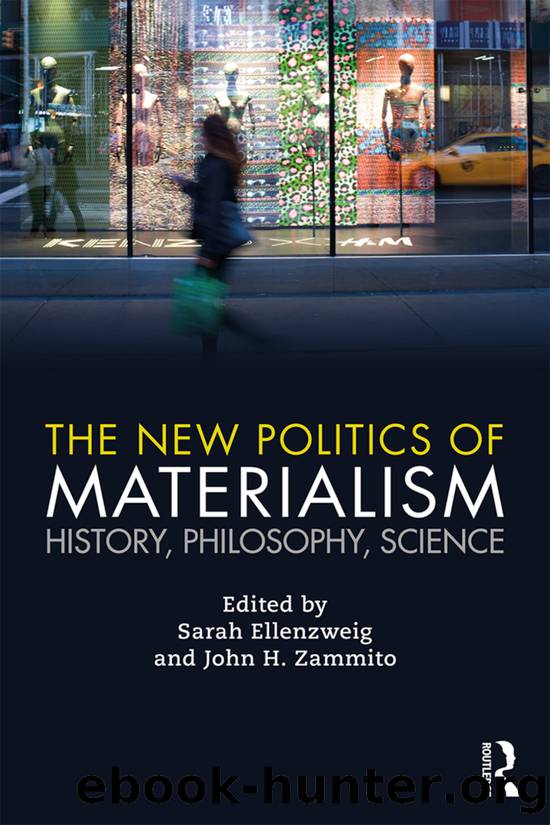The New Politics of Materialism by Sarah Ellenzweig John H Zammito & John H. Zammito

Author:Sarah Ellenzweig,John H Zammito & John H. Zammito
Language: eng
Format: epub
ISBN: 9781317556480
Publisher: Taylor & Francis (CAM)
PART III
Monism, Liveliness, and the Problem of Scale
8
The Cognitive Nonconscious and the New Materialisms
N. Katherine Hayles
Duke University
Among the promising developments for reassessing the traditional Âhumanist subject are the new materialisms. Their diversity notwithstanding, the theoretical frameworks proceeding under this banner generally argue for a similar set of propositions. Chief among these is decentering the human subject, along with the characteristics that have long been identified with human exceptionalism, including language, rationality, and higher consciousness. Also prominent is the idea that matter, rather than being passive and inert, is âlivelyâ and âvibrantâ (Bennett 2010). In some versions of the new materialisms, a strong emphasis on ontology emerges (Barad 2007, Parisi 2004, Braidotti 2006 and 2013), accompanied by a reframing of ontological premises, often along Deleuzian lines emphasizing metastabilities, dynamic processes, and assemblages (Grosz 2002 and 2011, Parikka 2010, Bennett 2010). In general, these approaches tend to locate the human on a continuum with nonhuman life and material processes rather than as a privileged special category (Braidotti 2006, Grosz 2002 and 2011). Finally, they emphasize transformative potentials, often linking these with the capacity for new kinds of political actions (Grosz 2002 and 2011, Braidotti 2006). After the baroque intricacies of the linguistic turn, these approaches arrive like bursts of oxygen to a fatigued brain. Focusing on the grittiness of actual material processes, they introduce materiality, along with its complex interactions, into humanities discourses that for too long and too often have been oblivious to the fact that all higher consciousness and linguistic acts, no matter how sophisticated and abstract, must in the first instance emerge from underlying material processes.1
Despite their considerable promises, the new materialisms also have significant limitations. Conspicuously absent from their considerations are consciousness and cognition, presumably because of the concern that if they were introduced, it would be all too easy to slip into received ideas and lose the radical edge that the focus on materiality provides. This leads to a performative contradiction: only beings with higher consciousness can read and understand these arguments, yet few if any new materialists acknowledge the functions that cognition enables for living and nonliving entities. Reading them, one looks in vain for recognition of cognitive processes, although they must necessarily have been involved for these discourses to exist at all.
A new materialist might object that there are already plenty of discourses, historical and contemporary, that play up the roles of consciousness and cognition, and it is not her obligation to rehearse or amend these in order to foreground materiality. Separating materiality from cognition does not, however, strengthen the case for materiality. On the contrary, it weakens it, for it erases the critical role played by materiality in creating the structures and organizations from which consciousness and cognition emerge. While this is by no means all that the âlivelinessâ of materiality can do, it is a particularly fraught and consequential form of material agency, and to ignore it leads to a very partial and incomplete picture. Moreover, such erasures encourage overly general analyses, in
Download
This site does not store any files on its server. We only index and link to content provided by other sites. Please contact the content providers to delete copyright contents if any and email us, we'll remove relevant links or contents immediately.
| Anthropology | Archaeology |
| Philosophy | Politics & Government |
| Social Sciences | Sociology |
| Women's Studies |
The Secret History by Donna Tartt(16625)
The Social Justice Warrior Handbook by Lisa De Pasquale(11489)
Thirteen Reasons Why by Jay Asher(7788)
This Is How You Lose Her by Junot Diaz(5774)
Weapons of Math Destruction by Cathy O'Neil(5037)
Zero to One by Peter Thiel(4824)
The Myth of the Strong Leader by Archie Brown(4789)
Promise Me, Dad by Joe Biden(4448)
Beartown by Fredrik Backman(4419)
Stone's Rules by Roger Stone(4416)
How Democracies Die by Steven Levitsky & Daniel Ziblatt(4399)
The Fire Next Time by James Baldwin(4343)
100 Deadly Skills by Clint Emerson(4079)
A Higher Loyalty: Truth, Lies, and Leadership by James Comey(4033)
Rise and Kill First by Ronen Bergman(4012)
The David Icke Guide to the Global Conspiracy (and how to end it) by David Icke(3883)
The Farm by Tom Rob Smith(3872)
Secrecy World by Jake Bernstein(3783)
The Doomsday Machine by Daniel Ellsberg(3731)
